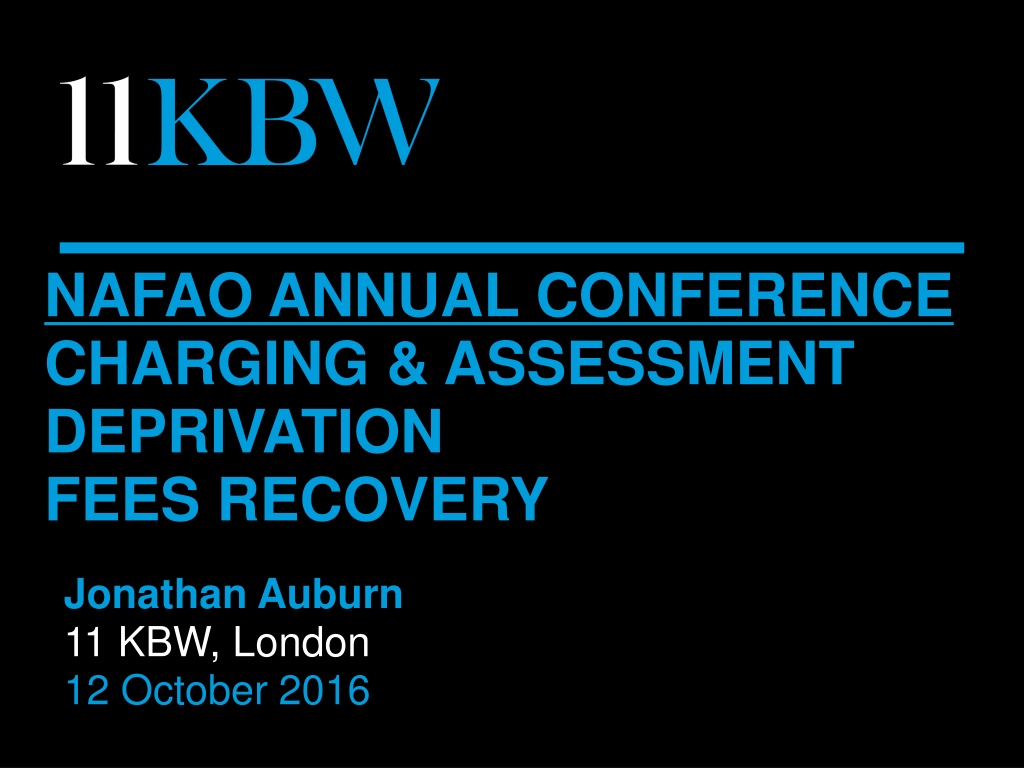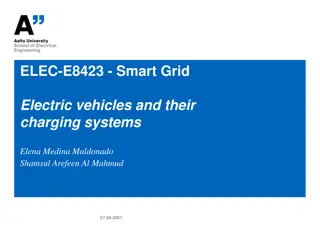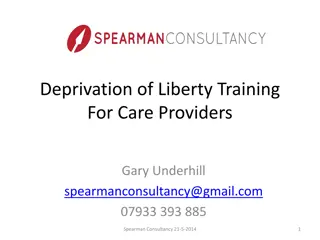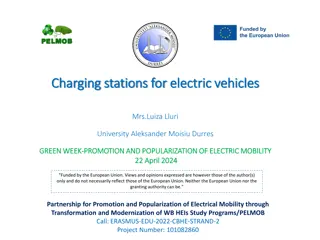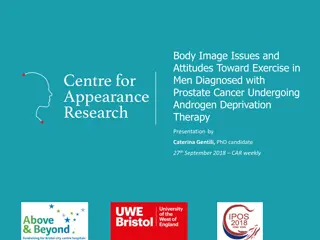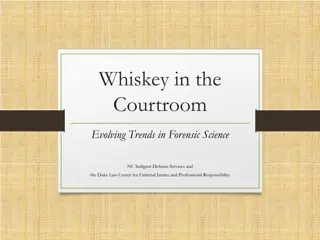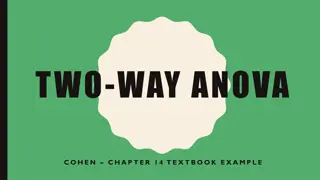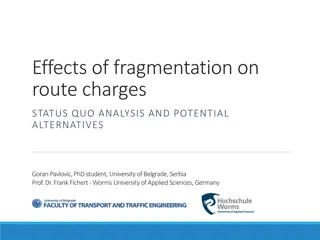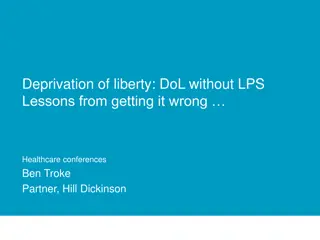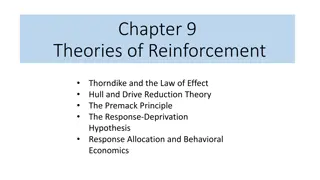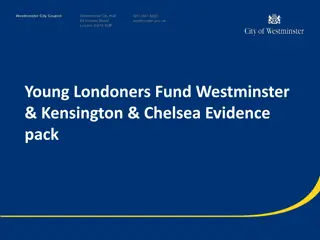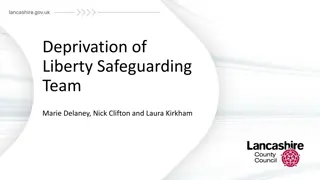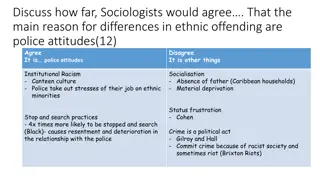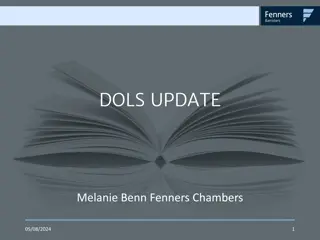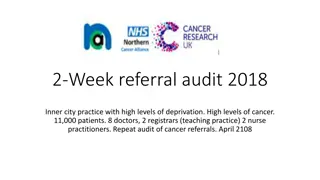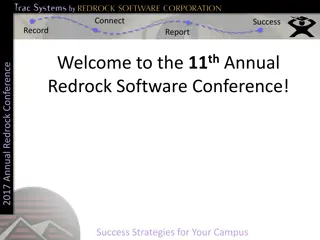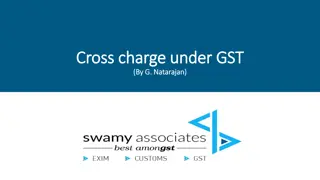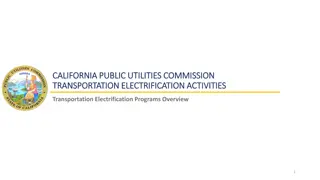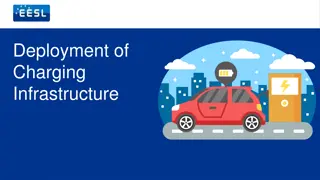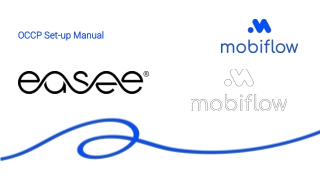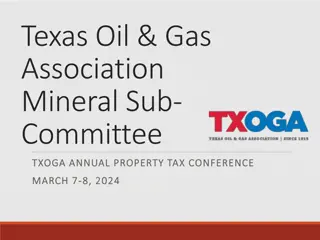Exploring Charging, Assessment, and Deprivation in Annual NAFAO Conference
Delve into the intricacies of charging, financial assessment, and debt recovery at the NAFAO Annual Conference featuring key sessions on topical issues, basic provisions, and the duty to charge in the context of care and support regulations. Gain insights on the power versus duty to charge, support for carers, and advocacy services. Discover the evolving landscape of charging practices, exploring discretionary measures and considerations for care homes, residential care, and non-residential services.
Download Presentation

Please find below an Image/Link to download the presentation.
The content on the website is provided AS IS for your information and personal use only. It may not be sold, licensed, or shared on other websites without obtaining consent from the author. Download presentation by click this link. If you encounter any issues during the download, it is possible that the publisher has removed the file from their server.
E N D
Presentation Transcript
NAFAO ANNUAL CONFERENCE CHARGING & ASSESSMENT DEPRIVATION FEES RECOVERY Jonathan Auburn 11 KBW, London 12 October 2016
sessions 11:30 12:30 Charging & financial assessment Deprivation 13:30 14:00 Debt recovery 11kbw.com 2
CHARGING & ASSESSMENT 11kbw.com 3
Basic provisions - Care Act 2014, Sections 14, 17 - Care and Support (Charging and Assessment of Resources) Regulations 2014 - Care and Support and Aftercare (Choice of Accommodation) Regulations 2014 - Care and Support Statutory Guidance, ch.8 11kbw.com 4
Topical issues in charging - duty to charge? - charging for advocacy services - charging carers 11kbw.com 5
Charging: power or duty? - Care Act s.14(1): may charge for ss.18-20 - ie where duty or power to provide care, or duty to support carer - suggests charging is fully discretionary - Compare NAA 1948 s.22: duty to charge for residential services - Is this a change??? 11kbw.com 6
Charging: is there still a duty to charge? Against duty to charge: - s.14 & change from 1948 Act - 16.10.14 impact assessment para 1.117: we are giving LAs new flexibility to decide whether or not to charge for residential care For duty to charge: - Guidance para 8.7: for care homes, if exceed capital limits, LA precluded from paying - para 8.13: above threshold different for care home & residential care - non-residential, LA must provide; if care home then not required to do so 11kbw.com 7
Charging for support for carers s.20: duty to meet carer s needs for support charging? Guidance does not like it BUT does not bar it see paras 8.49-8.55 outcome: possible, but prudent to record reasons for each decision to charge 11kbw.com 8
Charging for advocacy services Guidance refers to both free and charged services Does not mandate fully free services When inappropriate to charge? 11kbw.com 9
Financial assessment: provisions - Care Act s.17 - if eligible for care & LA thinks would charge, then duty to assess level of fin resources - s.17(3), (4): same re carers - s.17(6): must provide written record of ass t - Charging Regs, Regs 9-12 - Statutory Guidance chapter 8 11kbw.com 10
Refusals / non-cooperation non-coop & LA meets needs refusal of FA treat as having done FA & satisfied that exceed limit 11kbw.com 11
LIGHT TOUCH ASSESSMENT cost of the service is low and the person can clearly afford it, making the assessment disproportionate person has significant financial resources and does not wish to undergo full financial assessment in receipt of particular benefits showing that they cannot contribute towards own care Light touch assess t poss Reg 10, Guidance 8.22-26 The person must consent to the light touch assessment and its outcome 11kbw.com 12
Financial assessment: capital limits, Reg 12 Upper capital limit initially 23,250 charged for everything can ask the LA to arrange care from April 2015 B/n upper and lower limit Means tested support available May be charged a tariff income of 1 per week for every 250 in capital between the two amounts Lower capital limit initially 14,250 LA cannot charge on capital below lower limit, but income charge from income capital disregarded for financial assessment 11kbw.com 13
Who are you assessing? No power to assess a couple s resources jointly: Guidance para 8.8 If an individual lacks capacity, they should still be financially assessed: Guidance para 8.9 Design financial assessment and charging policies that take into account people who lack capacity Where possible, consult with family members Where possible, work with someone with legal authority to make financial decisions (EPA, LPA or Deputy). If this is not possible, involve the CoP 11kbw.com 14
Topical issues in financial assessment [1] Walford v Worcestershire time of consideration of disregard [2] Personal injury monies [3] Reasons for financial assessment decisions 11kbw.com 15
Walford v Worcestershire CC [2015] EWCA Civ 22 principle: consider disregard as at time person went into care home Facts: daughter of care home resident lived in same home & was over 60, so entitled to a disregard for the property Issue: did disregard apply only if property occupied at time went into care? nb: decided under pre-Care Act Regs 11kbw.com 16
Walford v Worcestershire (ctd) Court of Appeal: - starting point is purpose of disregards to protect vulnerable family members from losing their home - given the purpose, it should only apply if relative is in occupation at time the resident first enters the care home - govt not concerned for family members who may want to occupy the house in the future 11kbw.com 17
PERSONAL INJURY MONIES capital disregard: Charging and Assessment Regs, Reg 18(2) and Schedule 2, para 15 (personal injury trusts) and para 16 (payment specifically identified by court for providing care mirrors pre-Care Act - National Assistance (Assessment of Resources) Regulations 1992 (SI 1992/2977), regs 15(2), 21(1), Sch.3 para 10(3), Sch 4 para 19 look to terms of settlement re amount for care 11kbw.com 18
capital disregard for P.I. monies (ctd) pre-Care Act legislation had different rules for non-domiciliary care services (HASSASSA s.17) and residential care (NAA 1948) Now under Care Act same principles apply 11kbw.com 19
Income from P.I. settlement award treated as income rather than capital: see the Charging and Assessment of Resources Regulations, Reg.16(3) disregard provision: Charging Regs, Sched 1, paras 15(1), (3)(c), (d), (e), 15(2), 31 These suggest LAs must disregard awards of damages for PI, and trust funds derived from a payment made in consequence of a PI 11kbw.com 20
Income from P.I. settlement (ctd) income provisions are less clear than the capital provisions important to look closely at exact wording in Sched 1, para 15 categories 11kbw.com 21
Charging & Assesst Regs, Sch 1, para 15 (c) a payment from a trust whose funds are derived from a payment made in consequence of any PI to the adult; (d) a payment under an annuity purchased (i) pursuant to any agreement or court order to make payments to the adult; or (ii) from funds derived from a payment made, in consequence of any PI to the adult; or (e) a payment (not falling within sub-paragraphs (a) to (d)) received by virtue of any agreement or court order to make payments to the adult in consequence of any PI to the adult. 11kbw.com 22
Income from P.I. settlement (ctd) whether income derived from PI monies should be taken into account is undecided Freeman v Lockett [2006] EWHC 102 (QB) para 22 Crofton v NHS Litigation Authority [2007] 1 WLR 923, paras 81-83; para 83 - [this] is a matter for the discretion of the LA, untrammelled by any guidance in the Fairer Charging Policy as to how it should be exercised 11kbw.com 23
BUT broad policy basis for the disregarding of personal injury monies - Crofton paras 66-72 - R (Booker) v NHS Oldham [2010] EWHC 2593 (Admin) 11kbw.com 24
REASONS duty to provide reasons for financial assessment / charging R (Bhandari) v LB Croydon, Admin Ct 2016: decision of a LA re charging quashed normal standard for reasons concept of expansion of reasons on request - trad scepticism of after the event reasoning 11kbw.com 25
DEPRIVATION 11kbw.com 26
STRUCTURE RE DEPRIVATION - Care and Support (Charging and Assessment of Resources Regulations) 2014, Reg 17 (notional income), 22 (notional capital): which the adult has deprived themselves for the purpose of decreasing the amount they may be liable to pay towards the cost of meeting their needs for care and support - Care & Support Statutory Guidance, paras 8.27-8.30, Annex E - nb amended regularly - CRAG cancelled: Guidance, Annex I 11kbw.com 27
PROVING DEPRIVATION 1. what beneficial interest in the property? 2. disposed of whole or part? 3. reason for disposal 11kbw.com 28
Proving deprivation (ctd) [1] establishing beneficial interest - previous fin assessment forms - Land Registry [2] disposal - once LA shows facts indicating beneficial interest, onus then falls on resident to show that he is not the owner - eg holding legal title on trust - mere assertion insufficient - requires contemporaneous documentation evidencing intention, deeds etc 11kbw.com 29
Proving deprivation (ctd) [3] reason for disposal - intention of avoiding or reducing amount pay for care - need not be sole or dominant reason, only a significant one: IRC v Hashami - show that it was one of the reasons not just a by-product - if resident lacked capacity, look to attorney or deputy s motive 11kbw.com 30
Reasons for disposal Do nature/timing accord w. innocent explanation? nb many innocent explanations, eg normal gift Guidance Annex E, para 5: deprivation should not be automatically assumed, there may be valid reasons why someone no longer has an asset and a LA should ensure it fully explore this first. H/r, the overall principle should be that when a person has tried to deprive themselves of assets, this should not affect the amount of local authority support they receive 11kbw.com 31
Guidance, Annex E, para 11 There may be many reasons for a person depriving themselves of an asset. A local authority should therefore consider the following before deciding whether deprivation for the purpose of avoiding care and support charges has occurred: (a) whether avoiding the care and support charge was a significant motivation in the timing of the disposal of the asset; at the point the capital was disposed of could the person have a reasonable expectation of the need for care and support? (b) did the person have a reasonable expectation of needing to contribute to the cost of their eligible care needs? 11kbw.com 32
Proving reason for disposal - LA bears burden of proof on reason but note what it needs to prove sig reason - - Test is subjective, ie what in resident s mind But on basis of the objective evidence - Yule v Sth Lanarkshire: look to nature of the disposal w/in context of time & cirs - Inferences from objective evidence imp - 11kbw.com Timing is strong source of inference 33
Proving reason: using schemes / specialists schemes, e.g. Family Protection Trust or other specialists, e.g. firms advertising or with history of promoting schemes Are these evidence in themselves? How to use? What to use? 11kbw.com 34
Chances of proving deprivation / forum - issue of forum: same issue dealt with in judicial review (JR) and in debt claim - JR: LA makes decision - family must show unreasonableness - no live evidence - debt claim: onus on LA to prove - civil standard; live evidence different results / prospects? 11kbw.com 35
DEBT RECOVERY 11kbw.com 36
Types of action - statutory debt claim -s.69 - transfer of assets s.70 - Insolvency Act 11kbw.com 37
Debt - Section 69, Care Act - against resident OR estate - where is the contract? - statutory relief 11kbw.com 38
Transfers of assets: section 70 Section 70(1): transfer of assets at nil or under value with the intention of avoiding charges subs(2): transferee liable to pay diff b/n what care recipient would have been charged and what he was charged subs(3): tran/ee liable only to pay up to value of the benefit received 11kbw.com 39
Section 70 (ctd) subs(5): asset means anything which may be taken into a/c in financial assessment Annex E, para 19: calculate charges applying notional capital rule 11kbw.com 40
Insolvency Act Section 423: transactions defrauding creditors - gift or transactions at undervalue of present or future claims, or prejudicing claims - for purpose of putting assets beyond reach - court may make order restoring position 11kbw.com 41
Insolvency Act (ctd) - requires proof of intention - but defrauding creditors needs only to be one of the subst l intentions, not a dominant one - no need for any debt at the time of trans n - no limitation period - not necessary to establish dishonesty: Treharne v Brabon - acting on legal advice is not a sufficient defence: Arbuthnot Leasing v Havelet (No 2) 11kbw.com 42
LIMITATION PERIOD FOR DEBT CLAIMS 11kbw.com 43
Limitation period for debt claims Care Act, section 69(3): A sum is recoverable under this section (a) in a case in which the sum becomes due to the local authority on or after the commencement of this section, within six years of the date the sum becomes due; (b) in any other case, within three years of the date on which it becomes due. 11kbw.com 44
Limitation: what did we have before? PREVIOUSLY: - ordinary time limit on debt claims: 6 years Magistrates: 3 years - special procedure for summary enforcement before - summary enforcement not used so limit was 6 yrs 11kbw.com 45
National Assistance Act 1948, s.56(1) (1) Without prejudice to any other method of recovery, any sum due under this Act ... to a local authority (other than a sum due under an order made under section 43 of this Act) shall be recoverable summarily as a civil debt. (2) Notwithstanding anything in any Act, proceedings for the recovery of any sum in the manner provided by the last foregoing subsection may be brought at any time within three years after the sum became due. 11kbw.com 46
What does the Govt say? DoH s October 2014 Care & Support Statutory Guidance states at page 387: 23.25 for any debts that have accrued prior to the commencement of the Care Act 2014 the time period for recovering that debt continues to be three years as previously set out under Section 56 of the National Assistance Act 1948 as any change to this would be retrospective and unfair. 11kbw.com 47
DoH, Update on final Orders under the Care Act 2014 , paragraph 20: For debts that have accrued prior to the commencement of the Care Act 2014 and that would otherwise have been recovered under section 56 of the 1948 Act, the time period for recovering that debt continues to be three years from the date on which the sum in question became due, as previously set out under section 56 of the 1948 Act. 11kbw.com 48
Care Act 2014 (Transitional Provision) Order 2015 (SI 2015/995) , Article 3 (1) Subject to paragraphs (3) and (4), a sum or charge to which paragraph (2) applies is recoverable under section 69 of the Act (recovery of charges, interest etc) as if it were a sum due to the local authority in question under Part 1 of the Act. (2) This paragraph applies to any sum or charge due under Part 3 of the 1948 Act (local authority services) or section 17 of the 1983 Act (charges for local authorities in England and Wales) to a local authority in England in respect of support or services (including a sum or charge which becomes due on or after the date on which this Order comes into force). (3) Paragraph (1) does not apply to a sum or charge in respect of which proceedings for recovery have begun prior to this Order coming into force. (4) A sum or charge is recoverable under paragraph (1) within the period within which it would, but for this article, have been recoverable under section 56 of the 1948 Act (legal proceedings) or, as the case may be, section 17 of the 1983 Act. (5) Notwithstanding article 3(3) of the 2015 Order, neither section 56(1) of the 1948 Act nor section 17(4) of the 1983 Act apply in relation to a sum or charge which is recoverable under paragraph (1). 11kbw.com 49
TYPES OF REMEDIES 11kbw.com 50
